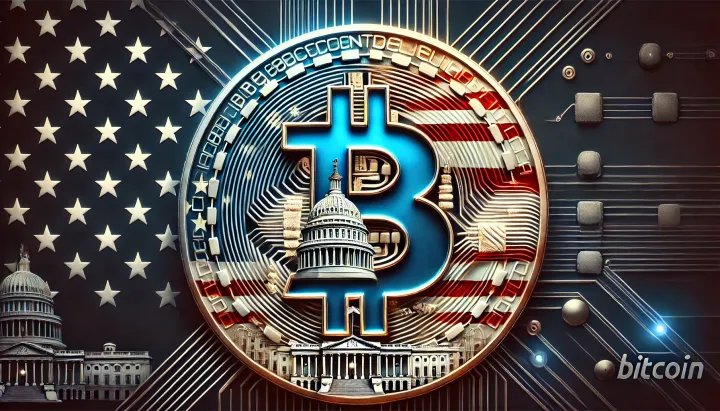Strategic Bitcoin in U.S. Politics: Aligning Policies for Financial Sovereignty
An October 31, 2024 episode of the Unchained podcast features Dennis Porter discussing Bitcoin’s increasing political relevance, particularly its role in the 2024 U.S. presidential election and state-level policy advancements.

- My 'briefing notes' summarize the content of podcast episodes; they do not reflect my own views.
- They contain (1) a summary of podcast content, (2) potential information gaps, and (3) some speculative views on wider implications.
- Pay attention to broadcast dates (I often summarize older episodes)
- Some episodes I summarize may be sponsored: don't trust, verify, if the information you are looking for is to be used for decision-making.
Summary
An October 31, 2024 episode of the Unchained podcast details Bitcoin’s increasing political relevance, particularly its role in the 2024 U.S. presidential election and state-level policy advancements. Dennis Porter discusses the distinct stances of Republicans and Democrats on Bitcoin, the need for bipartisan support, and the value of a Strategic Bitcoin Reserve to protect national economic interests. Porter’s insights focus on building momentum through state-led initiatives, growing the influence of Bitcoin voters, and framing Bitcoin as a tool for both financial inclusivity and reduced corporate influence in politics.
Take-Home Messages
- Bipartisan Collaboration: Broader bipartisan support is critical to embedding Bitcoin’s role as a national asset.
- Strategic Bitcoin Reserve for Stability: A federal Bitcoin reserve could strengthen the U.S. financial position, offering an alternative hedge in times of instability.
- State-Level Policy as a Foundation: Successful state policies set a precedent that could smooth the path for federal adoption.
- Impact of Bitcoin Voters: The growth of single-issue Bitcoin voters is likely to influence policy directions in future elections, especially in swing states.
- Consumer and Investor Trust: Policies like proof of reserves can reinforce Bitcoin’s transparency, building consumer confidence and protecting market integrity.
Overview
In this October 31, 2024 episode of the Unchained podcast, Dennis Porter explains how Bitcoin’s position in U.S. politics is shaped by both Republican and Democratic attitudes. Republicans champion Bitcoin as a form of financial independence and reduced government oversight, while Democrats exhibit cautious openness, focusing on consumer protection and Bitcoin’s potential for inclusivity. Porter notes that while Republicans are leading the way, Democrats may increasingly support Bitcoin as they recognize its alignment with values like transparency and accessibility.
A central proposal discussed is a Strategic Bitcoin Reserve, which Porter believes could position the U.S. advantageously in the global economic landscape. This reserve could act as a digital hedge, complementing traditional reserves, and offering a decentralized counterweight to centralized monetary policies. While the reserve’s success relies on a favorable political climate, Porter sees its potential to address national security and stability concerns.
State-level efforts have been crucial in promoting Bitcoin-friendly policies, with Porter’s organization, Satoshi Action Fund, implementing policies in Republican-led states that protect Bitcoin mining, self-custody, and node operation rights. By creating this template at the state level, Porter hopes to build momentum toward federal acceptance. Additionally, he highlights the influence of Bitcoin voters as a growing political force capable of swaying elections in key states. This influence, he believes, will continue to grow as more voters prioritize Bitcoin-related policies.
Stakeholder Perspectives
- Bitcoin Advocates: View the Strategic Bitcoin Reserve as a vital safeguard for economic stability and support grassroots policy changes at the state level.
- Republican Policymakers: Favor Bitcoin for its decentralized nature, small-government potential, and resistance to federal monetary control.
- Democratic Policymakers: Show interest in Bitcoin’s consumer protection aspects and its role in supporting financial inclusivity, despite initial hesitations.
- Investors: Seek regulatory clarity that bipartisan support might offer, which could reduce perceived risks and encourage long-term investment.
Implications
Should bipartisan support develop, Bitcoin could secure its position as a strategic asset in U.S. policy, especially if initiatives like the Strategic Bitcoin Reserve gain traction. A federal reserve of Bitcoin may redefine U.S. financial sovereignty, potentially balancing the fiat monetary system with a decentralized, digital alternative. Porter’s consumer protection messaging could align Bitcoin’s transparency benefits with Democratic values, facilitating a pathway to broader acceptance.
State-level efforts provide a foundational policy framework that federal entities could adopt, offering a model for both innovation and regulation. As these policies gain support, Bitcoin may attract greater institutional interest, presenting new opportunities in finance and governance. Furthermore, the increase in single-issue Bitcoin voters could amplify Bitcoin’s influence, especially in swing states, shifting political landscapes and potentially embedding Bitcoin deeper in future policy considerations.
Future Outlook
Porter anticipates Bitcoin’s role in U.S. politics will solidify through bipartisan efforts, with its adoption accelerating in response to the increasing influence of Bitcoin-focused voters. He foresees policies that protect Bitcoin’s core values—like transparency and decentralization—becoming central to both state and federal legislation. The Strategic Bitcoin Reserve, while in its early conceptual stages, could emerge as a defining policy, positioning Bitcoin as a pillar of national financial resilience.
As voter engagement deepens, Bitcoin-related issues will likely become increasingly prominent in policy debates, swaying outcomes in critical elections. Porter’s vision suggests a policy landscape where Bitcoin serves not only as a strategic financial asset but also as a unifying force in an otherwise divided political climate.
Information Gaps
- How can bipartisan support for Bitcoin be effectively cultivated in the U.S. political landscape? With bipartisan support seen as key to Bitcoin’s sustainable growth, understanding effective strategies to bridge the partisan divide will inform future policies and increase Bitcoin's acceptance across political lines.
- What potential advantages or risks could a Strategic Bitcoin Reserve introduce to U.S. national security? Assessing the strategic value of a Bitcoin reserve can clarify its role in national security, helping to inform whether such a reserve could serve as a viable alternative or complement to traditional assets.
- What specific aspects of Bitcoin’s structure align with consumer protection principles? Exploring Bitcoin's consumer protection features can strengthen arguments for its adoption among policymakers, particularly Democrats who prioritize consumer security and financial inclusivity.
- What evidence supports Bitcoin’s potential to improve financial inclusion for marginalized groups? Bitcoin’s capacity to provide banking alternatives could support its policy appeal, especially if evidence shows real-world benefits for underbanked communities.
- How does Bitcoin serve as a practical check on government monetary policy? Understanding Bitcoin's role in decentralizing monetary power offers insights into how it could reshape central banking practices, guiding policymakers in adapting financial frameworks to include digital assets.
Broader Implications
Bitcoin’s Role in Reducing Corporate Influence in Politics
Bitcoin offers a unique mechanism for reducing the influence of corporate money in politics by decentralizing financial power away from traditional institutions. This shift could lead to a political environment less dependent on high-stakes lobbying, challenging the dominance of powerful corporate entities. With fewer centralized financial interests, there may be more space for representative democracy to focus on the needs of constituents rather than special interest groups.
Strengthening U.S. Economic Sovereignty
A Strategic Bitcoin Reserve could serve as a complementary asset in national reserves, reinforcing economic sovereignty. Unlike fiat assets, Bitcoin's decentralized structure resists inflationary manipulation, offering stability during economic uncertainty. By hedging with Bitcoin, the U.S. could reduce reliance on the Federal Reserve’s monetary policy alone, creating a more resilient and diversified financial strategy for national security.
Pathways for Financial Inclusion
Bitcoin’s decentralized network allows anyone to participate, offering an alternative to traditional financial services that often exclude marginalized groups. For policymakers focused on inclusion, Bitcoin represents an accessible, non-discriminatory financial tool, potentially aligning with progressive goals. If supported by policy, Bitcoin could serve as a bridge for individuals without traditional banking access, furthering financial equality.



Comments ()